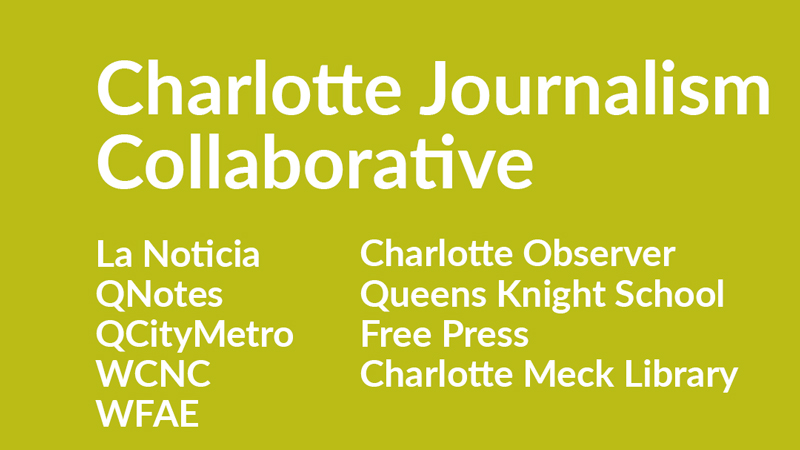To strengthen local journalism and encourage greater connection between reporters and Charlotte residents, Solutions Journalism Network is launching the Charlotte Journalism Collaborative, a partnership of six major media companies and three local institutions focusing on issues of major importance to the Charlotte region. The collaborative is supported by $150,000 from the John S. and James L. Knight Foundation, as part of the $300 million commitment Knight announced last month to rebuild the future of local journalism, essential to a functioning democracy.
The Charlotte Journalism Collaborative is modeled on the Solutions Journalism Network method of investigating and reporting news with a primary focus on solutions to community problems.
“At a time when local journalism jobs are disappearing and trust in media has hit an all-time low, the Solutions Journalism Network has taken on the challenge by organizing collaborative journalism reporting projects that promote excellent reporting and civic dialogue. The model has the potential to be part of a new wave of great local reporting, which is vital to building strong communities,” said Karen Rundlet, Knight Foundation director for journalism.
The Charlotte group will focus this year on the affordable housing crisis in Charlotte, a rapidly growing region whose citizens face increasing difficulty finding affordable places to live close to work, schools and community centers. This is causing enormous stress on those with the fewest resources, including people of color and working class residents affected by skyrocketing property values and taxes, and the increasing problem of displacement.
Members of the collaborative include La Noticia, The Charlotte Observer, WCNC-TV, QCity Metro, WFAE 90.7FM and QNotes, as well as the James L. Knight School of Communication at Queens University of Charlotte, the Charlotte Mecklenburg Library and Free Press, a community-engagement organization.
“Solutions Journalism Network is thrilled to have been given the opportunity to work with such a talented and dynamic group of colleagues, said Liza Gross, vice president of newsroom practice change at the Solutions Journalism Network. “We are confident the Charlotte Collaborative will produce memorable solutions journalism that will inform and engage the community in unique and innovative ways.”
The collaborative is supported by funding from Knight Foundation, through the Solutions Journalism Network, based in New York City. The collaborative is gearing up to begin publishing news content on affordable housing this spring. The goal of this effort is to provide an essential addition to the media landscape in the Charlotte region that will grow to include other media organizations and become self-sustaining.
Formation of the group was led by Michael Davis, south region manager for the Solutions Journalism Network, based in the Charlotte area. Primary representatives of the collaborative:
● Hilda Gurdian, publisher and founder of La Noticia, the primary media outlet serving the Latino community across North Carolina
● Jim Yarborough, publisher of QNotes, the innovative media firm established to serve the LGBTQ community in the Charlotte area.
● Amy Lehtonen, director of digital media for WCNC-TV, an NBC affiliate owned by TEGNA Inc., and one of the major television stations in the Charlotte region.
● Glenn Burkins, editor and publisher who founded QCity Metro, the leading news website serving the African-American community in the Charlotte region.
● Jennifer Lang, senior editor, digital and product at WFAE, the NPR news station in the Charlotte region.
● Ronnie Glassberg, metro editor at the Charlotte Observer, the leading daily newspaper and news website in the Charlotte region. Glassberg recently took over this role following the retirement of Helen Schwab, who was instrumental in formation of the Charlotte collaborative.
● Rick Thames, executive in residence at the James L. Knight School of Communication, and former executive editor of the Charlotte Observer.
● Alicia Bell, community organizer with Free Press, a community engagement organization working in the Charlotte area.
● Seth Ervin, chief innovation officer for the Charlotte Mecklenburg Library, which is working closely with the collaborative and will host its website.
● Neil Mara, project editor for the collaborative, who is a former journalist and technology manager, most recently director of publishing systems for McClatchy, the Observer’s parent company.
“Creating a Charlotte with more opportunity for people to shape their community and be part of its growth, means ensuring that they are equipped with the information and the avenues they need to contribute. Solutions Journalism will help push this important goal forward,” said Charles Thomas, Knight Foundation program director for Charlotte.
Knight Foundation supports transformational ideas that promote quality journalism, advance media innovation, engage communities and foster the arts. We believe that democracy thrives when people and communities are informed and engaged. For more information, visit kf.org.
About the Solutions Journalism Network
The Solutions Journalism Network’s mission is to spread the practice of solutions journalism: rigorous reporting on responses to social problems. We seek to rebalance the news, so that every day people are exposed to stories that help them understand problems and challenges, and stories that show potential ways to respond.
About the John S. and James L. Knight Foundation
Knight Foundation is a national foundation with strong local roots. We invest in journalism, in the arts, and in the success of cities where brothers John S. and James L. Knight once published newspapers. Our goal is to foster informed and engaged communities, which we believe are essential for a healthy democracy.
News coverage of the collaborative
Poynter Institute – How nine newsrooms in Charlotte are trying to create a local news ecosystem
Nieman Lab – Nine local partners in Charlotte form a new reporting collaborative
The Charlotte Observer – Charlotte media collaborative to focus on city’s affordable housing crisis
